
Darkwater: Voices from Within the Veil is a literary work by W.E.B. Du Bois. Published in 1920, the text incorporates autobiographical information as well as essays, spirituals, and poems that were all written by Du Bois himself.

Darkwater: Voices from Within the Veil is a literary work by W.E.B. Du Bois. Published in 1920, the text incorporates autobiographical information as well as essays, spirituals, and poems that were all written by Du Bois himself.
Written when he was 50, Darkwater is the first of Du Bois's three autobiographies and was followed by Dusk of Dawn: An Autobiography of a Race Concept , and The Autobiography of W. E. B. Du Bois: A Soliloquy on Viewing My Life from the Last Decade of its First Century.
Du Bois maintained that the book was written to develop an understanding of the complications of the color-line with emphasis on its political implications.
“I venture to write again on themes on which great souls have already said greater words, in the hope that I may strike here and there a half-tone, newer even if slighter, up from the heart of my problem and the problems of my people.” [1]
An overarching theme of this work is the unifying character of labor, and its contrast with traditional conflict between historical identities. Usually this is cast in terms of conflict between white and black workers, but with some variation. For example:
Our great ethical question today is, therefore, how may we justly distribute the world's goods to satisfy the necessary wants of the mass of men.
What hinders the answer to this question? Dislikes, jealousies, hatreds, -- undoubtedly like the race hatred in East St. Louis; the jealousy of English and German; the dislike of the Jew and the Gentile. But these are, after all, surface disturbances, sprung from ancient habit more than from present reason. They persist and are encouraged because of deeper, mightier currents. If the white workingmen of East St. Louis felt sure that Negro workers would not and could not take the bread and cake from their mouths, their race hatred would never have been translated into murder. If the black workingmen of the South could earn a decent living under decent circumstances at home, they would not be compelled to underbid their white fellows.
Thus the shadow of hunger, in a world which never needs to be hungry, drives us to war and murder and hate. But why does hunger shadow so vast a mass of men? Manifestly because in the great organizing of men for work a few of the participants come out with more wealth than they can possibly use, while a vast number emerge with less than can decently support life. In earlier economic stages... [2]
Several of its essays are personal in nature, with obvious emotional rhetoric. The style maintains a religious tone and his spirituality is a common thread in many of the individual essays. Described in varying tones of black and brown, a Christ-like figure of racial hope is prevalent, signifying the coming moment of racial confrontation and eventual salvation. This figure is one which Du Bois characterizes as the bearer of eternal freedom from discrimination, poverty, and from the color line itself. [3] The stories within Darkwater also revolve around discontent with the way that democracy was viewed and handled among people of different ethnic, racial, and social groups. [4]
The chapter structure of Darkwater follows a consistent pattern of a narrative section and a poetic section, both within one chapter. The narrative sections are frequently autobiographical or are otherwise works of speculative fiction. In this text Du Bois compiles previously written works from The Atlantic , The Independent, The Crisis , and the Journal of Race Development .
In his chapter called "The Damnation of Women," Du Bois seeks to elevate women by acknowledging their labor in the home, the workplace and the black church. The chapter has been described as one of the first proto-feminist analyses by a male intellectual. [5] In the chapter, Du Bois gives the black mother even more glorification for her role as child bearer. He calls for women to seek a life of economic independence, and argues that women have a right to control their own bodies and reproductive choices. Yet in his description of women he often describes their physical traits first such as his description of journalist Mary Shadd Cary whom Du Bois described as a "ravishing dream-born beauty." [6]
Darkwater opens with "Credo", which was frequently reprinted in contexts other than within the book. It was written in style similar to a Christian creed and was his statement of faith and vision for change. "Credo" was widely read and recited. [7]
It begins with the prophetic statement
I believe in God who made of one blood all races that dwell on earth. I believe that all men, black and brown and white, are brothers, varying, through Time and Opportunity, in form and gift and feature, but differing in no essential particular, and alike in soul and in the possibility of infinite development.
and later speaks to freedom and dreams
I believe in Liberty for all men; the space to stretch their arms and their souls; the right to breathe and the right to vote, the freedom to choose their friends, enjoy the sunshine and ride on the railroads, uncursed by color; thinking, dreaming, working as they will in a kingdom of God and love.
Darkwater: Voices From Within the Veil was well received by audiences after it was first published, helping to open the eyes of readers to the problems of racial discrimination in America. [8] In his review of Darkwater in the popular magazine The Survey Robert Foerster writes, “Actually it is a book so skillfully put together, so passionately felt, so lyrically expressed, that it will be read widely.” [9]

William Edward Burghardt Du Bois was an American sociologist, socialist, historian, and Pan-Africanist civil rights activist. Born in Great Barrington, Massachusetts, Du Bois grew up in a relatively tolerant and integrated community. After completing graduate work at the Friedrich Wilhelm University and Harvard University, where he was the first African American to earn a doctorate, he became a professor of history, sociology, and economics at Atlanta University. Du Bois was one of the founders of the National Association for the Advancement of Colored People (NAACP) in 1909.
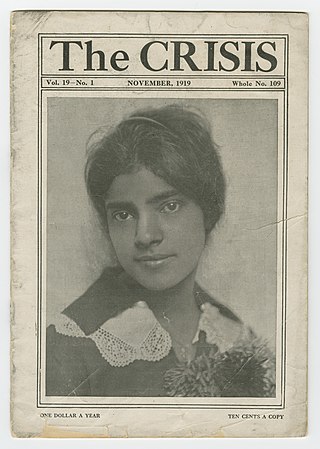
The Crisis is the official magazine of the National Association for the Advancement of Colored People (NAACP). It was founded in 1910 by W. E. B. Du Bois (editor), Oswald Garrison Villard, J. Max Barber, Charles Edward Russell, Kelly Miller, William Stanley Braithwaite, and Mary Dunlop Maclean. The Crisis has been in continuous print since 1910, and it is the oldest Black-oriented magazine in the world. Today, The Crisis is "a quarterly journal of civil rights, history, politics and culture and seeks to educate and challenge its readers about issues that continue to plague African Americans and other communities of color."
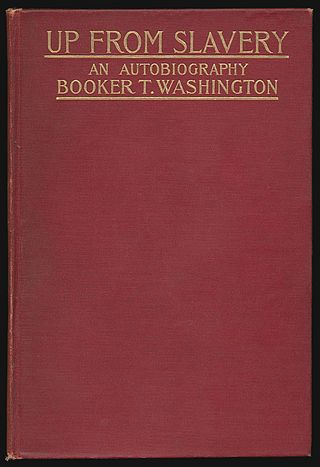
Up from Slavery is the 1901 autobiography of American educator Booker T. Washington (1856–1915). The book describes his experience of working to rise up from being enslaved as a child during the Civil War, the obstacles he overcame to get an education at the new Hampton Institute, and his work establishing vocational schools like the Tuskegee Institute in Alabama to help Black people and other persecuted people of color learn useful, marketable skills and work to pull themselves, as a race, up by the bootstraps. He reflects on the generosity of teachers and philanthropists who helped educate Black and Native Americans. He describes his efforts to instill manners, breeding, health and dignity into students. His educational philosophy stresses combining academic subjects with learning a trade. Washington explained that the integration of practical subjects is partly designed to "reassure the White community of the usefulness of educating Black people".
African American literature is the body of literature produced in the United States by writers of African descent. It begins with the works of such late 18th-century writers as Phillis Wheatley. Before the high point of enslaved people narratives, African-American literature was dominated by autobiographical spiritual narratives. The genre known as slave narratives in the 19th century were accounts by people who had generally escaped from slavery, about their journeys to freedom and ways they claimed their lives. The Harlem Renaissance of the 1920s was a great period of flowering in literature and the arts, influenced both by writers who came North in the Great Migration and those who were immigrants from Jamaica and other Caribbean islands. African American writers have been recognized by the highest awards, including the Nobel Prize given to Toni Morrison in 1993. Among the themes and issues explored in this literature are the role of African Americans within the larger American society, African-American culture, racism, slavery, and social equality. African-American writing has tended to incorporate oral forms, such as spirituals, sermons, gospel music, blues, or rap.
Dark Water may refer to:
Hazel Vivian Carby is Professor Emerita of African American Studies and of American Studies. She served as Charles C & Dorathea S Dilley Professor of African American Studies & American Studies at Yale University.
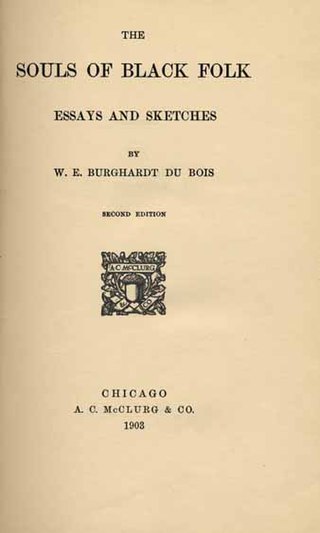
The Souls of Black Folk: Essays and Sketches is a 1903 work of American literature by W. E. B. Du Bois. It is a seminal work in the history of sociology and a cornerstone of African-American literature.
Double consciousness is the internal conflict experienced by subordinated or colonized groups in an oppressive society. The term and the idea were first published in W. E. B. Du Bois's autoethnographic work, The Souls of Black Folk in 1903, in which he described the African American experience of double consciousness, including his own.
The talented tenth is a term that designated a leadership class of African Americans in the early 20th century. Although the term was created by white Northern philanthropists, it is primarily associated with W. E. B. Du Bois, who used it as title of an influential essay, published in 1903. It appeared in The Negro Problem, a collection of essays written by leading African Americans and assembled by Booker T. Washington.
The term color line was originally used as a reference to the racial segregation that existed in the United States after the abolition of slavery. An article by Frederick Douglass that was titled "The Color Line" was published in the North American Review in 1881. The phrase gained fame after W. E. B. Du Bois' repeated use of it in his 1903 book The Souls of Black Folk.
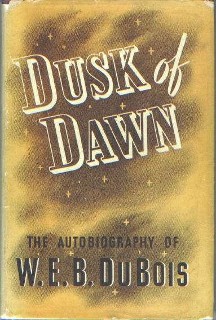
Dusk of Dawn: An Essay Toward an Autobiography of a Race Concept is a 1940 autobiographical text by W. E. B. Du Bois that examines his life and family history in the context of contemporaneous developments in race relations.
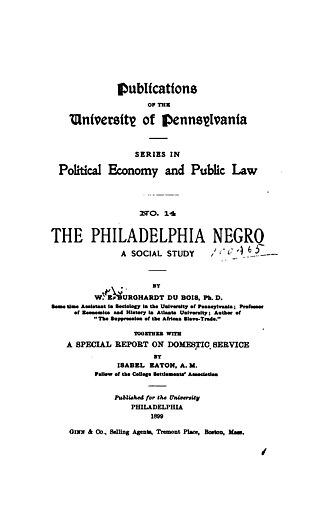
The Philadelphia Negro is a sociological study of African Americans in Philadelphia written by W. E. B. Du Bois, commissioned by the University of Pennsylvania and published in 1899 with the intent of identifying social problems present in the African American community. It was the first sociological case study of a black community in the United States and one of the earliest examples of sociology as a statistically based social science. Du Bois gathered information for the study in the period between August 1896 and December 1897.
The Study of the Negro Problems, from The Annals of the American Academy of Political and Social Science, is an essay written by professor, sociologist, historian and activist W. E. B. Du Bois. It both challenges the question he poses in his The Souls of Black Folk (1903) of “How does it feel to be a problem?” and is reminiscent of the popular mindset of white people toward people of color at the time.

Soul on Ice is a memoir and collection of essays by Eldridge Cleaver. Originally written in Folsom State Prison in 1965, and published three years later in 1968, it is Cleaver's best known writing and remains a seminal work in African-American literature. The treatises were first printed in the nationally-circulated monthly Ramparts and became widely read for their illustration and commentary on Black America. Throughout his narrative, Cleaver describes not only his transformation from a marijuana dealer and serial rapist into a convinced Malcolm X adherent and Marxist revolutionary, but also his analogous relationship to the politics of America.

The sociology of race and ethnic relations is the study of social, political, and economic relations between races and ethnicities at all levels of society. This area encompasses the study of systemic racism, like residential segregation and other complex social processes between different racial and ethnic groups.
The Negro in the South is a book written in 1907 by sociologist W. E. B. Du Bois and educator Booker T. Washington that describes the social history of African-American people in the southern United States. It is a compilation of the William Levi Bull Lectures on Christian Sociology from that year. Washington and Du Bois had recently co-contributed to the Washington-edited 1903 collection The Negro Problem.
The Comet is a science fiction short story, written by W. E. B. Du Bois in 1920. It discusses the relationship between Jim Davis and Julia after a comet hits New York and unleashes toxic gases that kill everyone in New York except them.
The Negro Problem is a collection of seven essays by prominent Black American writers, such as W. E. B. Du Bois and Paul Laurence Dunbar, edited by Booker T. Washington, and published in 1903. It covers law, education, disenfranchisement, and Black Americans' place in American society.
African-American socialism is a political current that emerged in the nineteenth century, specifically referring to the origins and proliferation of Marxist ideologies among African-Americans for whom socialism represents a potential for equal class status, humane treatment as laborers, and a means of dismantling American capitalism. Black liberation is in line with Marxist theory, which asserts that the working class, regardless of race, has a common interest against the bourgeoisie.
Racial uplift is a term within the African American community that motivates educated blacks to be responsible in the lifting of their race. This concept traced back to the late 1800s, introduced by black elites, such as W. E. B. Du Bois, Booker T. Washington, and African American musicians like Florence Price, who were significant contributors. During the beginnings of racial uplift, hymns and negro spirituals played a vital role in shaping the spiritual culture of African Americans. Although these musical selections are mainly prevalent inside the black church, contemporary gospel music has been utilized for the liberation and uplift of the oppressed black race. Aside from music, African American leaders have used concepts such as Du Bois's double consciousness that describe the idea of blackness and the complexities of identity in the various lens in which the black race envisions themselves in American society.